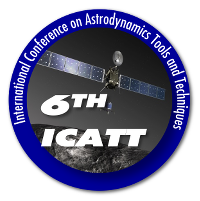Speaker
Ms
Marilena Di Carlo
(University of Strathclyde)
Description
In this work a toolbox for the fast preliminary design and optimisation of low-thrust trajectories is presented. The toolbox, called CAMELOT (Computational-Analytical Multi-fidelity Low-thrust Optimisation Toolbox), solves highly complex combinatorial problems to plan multi-target missions characterised by long spirals including different perturbations. CAMELOT implements a novel multi-fidelity approach combining analytical, adaptive surrogate modelling and accurate computational estimations of the mission cost. Decisions are then made by using two optimisation engines included in the toolbox.
The main elements of CAMELOT are:
• Fast Analytical Boundary-value Low-thrust Estimation (FABLE)
• Multi-Population Adaptive Inflationary Differential Evolution Algorithm with Adaptive Local Restart (MP-AIDEA)
• Automatic Incremental Decision Making And Planning (AIDMAP)
FABLE provides accurate cost estimations of orbital transfers using a multi-fidelity analytical and semi-analytical approach. FABLE implements an analytical propagator that includes perturbations due to the J2 zonal harmonic, drag, solar radiation pressure and low-thrust propulsion. The effect of shadow regions is also included. Different control parameterization can be implemented to analytically compute optimal transfers. In order to reduce the computation burden, FABLE can generate surrogate models of the transfers’ cost to allow fast evaluation of complex trajectories.
MP-AIDEA is a single objective global optimiser based on the hybridisation of evolutionary computation and mathematical programming. The optimiser has been designed to automatically adapt its input parameters to the specific problem under consideration, in order to avoid tedious manual tuning of the algorithm.
AIDMAP is an incremental decision making algorithm that allows for planning & scheduling of complex tasks. AIDMAP incrementally builds a decision tree from a database of elementary building blocks. The resulting graph is then evaluated using a set of deterministic or probabilistic heuristics. The deterministic heuristics in AIDMAP are derived from classical Branch & Cut algorithms while the probabilistic heuristics are bio-inspired and mimic the evolution of the slime mould Physarum Polycephalum, a simple organism endowed by nature with a powerful problem-solving heuristic.
CAMELOT has been applied to a variety of applications from the design of interplanetary trajectories to the optimal deorbiting of space debris, from the deployment of constellations to on-orbit servicing.
The paper will present two key applications. One is a multi-fly-by interplanetary mission to the inner part of the solar system to visit the fourteen known Atira asteroids, and search for new ones. CAMELOT was used to generate a globally optimal sequence of asteroids, departure and arrival dates, that allows visiting the maximum number of Atira asteroids in a given time and maximises the chance to discover new ones.
The other is a solution to the problem of deorbiting multiple non-cooperative objects from the LEO region. CAMELOT was used to identify the sequence of targets that maximize the number of removed satellites, while minimizing the propellant consumption, using two different strategies: multi-target delivery of de-orbiting kits to perform a controlled re-entry, low-thrust fetch and deorbit with a single towing spacecraft. To speed up the computation, a surrogate model for the ΔV required to realise all possible low-thrust transfers between different targets was used.
| Applicant type | First author |
|---|
Primary authors
Mr
Juan Manuel Romero Martin
(University of Strathclyde)
Ms
Marilena Di Carlo
(University of Strathclyde)
Co-author
Prof.
Massimiliano Vasile
(University of Strathclyde)

